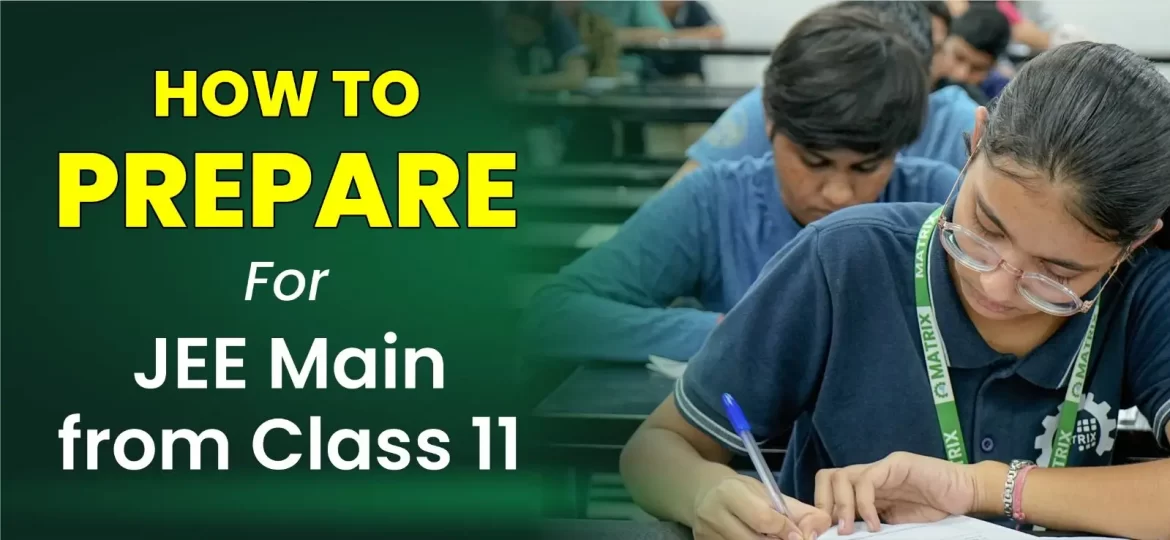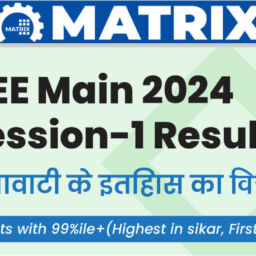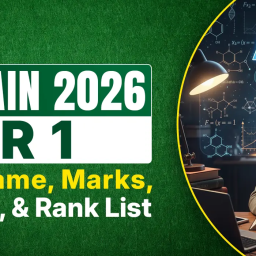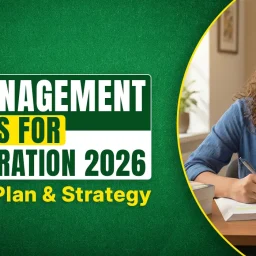
How to Prepare for JEE Main from Class 11
Kanak, a proud student of Matrix Institute, came to us with the same question: how to prepare for JEE Main from class 11? She is now studying at IIT Bombay. Kanak’s advice for how to prepare for JEE Main: Do not waste time on choosing the right books or collecting a lot of different books. Sticking to the basics, which are coaching materials and NCERTs, is more effective.
Based on strategies suggested by experts at Matrix, Kanak secured AIR 517 in JEE Advanced 2025. She made sure to finish all subject chapters alongside her coaching classes, which helped with consistency (great way to avoid backlogs!). At Matrix, we have DPPs, which are topic-wise practice sheets. She regularly analysed her DPPs and star-marked all the difficult questions. She reached out to our mentors for immediate clarification of doubts. In this blog, we will strategise a golden success roadmap for JEE Main preparation from class 11. We will discuss subject-wise strategies, time management, revision tips, and the mindset that will lead to success.
Why Starting JEE Preparation in Class 11 is a Game-Changer?
Starting preparation in class 11 is like gaining an unfair advantage. Students have control over time, can cover the syllabus sooner, and train their minds for the exam. Small, consistent efforts give massive results over time and are the best way to prepare for JEE Main from class 11.
At Matrix, we have Momentum batches where we provide a comprehensive preparation schedule so that students can focus on concepts and foundation building along with their board exams. To promote early JEE preparation, we started the Matrix Edge batch for students of Classes 5th to 10th. This will help in developing aptitude, reasoning, and other essential skills that have been proven to be fruitful. Here are some reasons why early preparation can be a game-changer for aspirants:
- The Student has enough time to gain clarity on the concepts. With consistency along with regular revision, whatever the student has learned will multiply.
- Starting early gives students the time and space to study the subjects. They have control over time and study pace. The student is not rushing to finish the syllabus out of anxiety. The focus is on learning and mastering the concepts. This reduces stress as preparation is spread along for two years.
- Along the preparation journey, every student makes mistakes, and they learn from them. Starting early gives that advantage to make mistakes and improve without stressing over time.
- The core behind any exam preparation is gaining conceptual depth. Starting early means having time to go deep into the concepts, asking all the whys and hows.
Mentors at Matrix focus on giving data-driven feedback. We track and assess the students’ progress. We help students identify their strengths, weaknesses, and gaps that can be filled. It can be concluded that the real return on investment of starting early is a smooth exam preparation journey with mental freedom.
JEE Main Exam Pattern
Many students come to our Matrix mentors with the same question: how to prepare for JEE Main from class 11? Before diving into this question and exam strategies, the first thing we want them to understand is the JEE Main exam pattern. A good grasp of the exam pattern and syllabus will help in making a reliable study plan, which will be easy to stick to. Browse the table for an updated JEE Main 2026 exam structure:
| Key Components | Description |
| Exam conducting body | NTA |
| Duration of the exam | 3 hours |
| Mode of exam | CBT(Computer Based Test) |
| Subjects | Maths, Physics, Chemistry |
| Type of Questions | MCQs and numerical value questions |
| Total questions | 75 |
| Number of questions per subject | 25(20 MCQs and 5 numericals) |
| Marking scheme | +4(correct answer), -1(incorrect MCQ), no negative marking for numeric |
| Total marks | 300 marks |
| Medium of language | English, Hindi, other regional languages (refer to NTA guidelines) |
Note: as per 2026 guidelines, no more optional numericals. All 25 questions are compulsory.
Strategy for JEE Main Preparation from Class 11
Working hard is as important as working smart. It is never about the number of hours you have studied. But more about how strategically those hours are spent before building the strategy for your preparation. To create a long-lasting strategy, these points will be helpful. Our students at Matrix have smartly included these strategies to maximise their study hours.
Tip from our matrix mentors: The preparation journey is more than mocks and test scores. It is about learning how to learn. This will create a firm foundational base.
- Building The Right Foundation(NCERTs):
The first step to how to prepare for JEE Main from class 11 is to stick to the basics. Studying the NCERTs will bring more clarity. Matrix study materials have been arranged in a way that the basics are covered first and then slowly move into advanced topics. Start your preparation with a deep understanding of the NCERT, along with solving the easy questions from the Matrix practice sheets. We have divided practice sheets into easy, moderate, and advanced questions.
- Daily Routine For A Class 11 JEE Aspirant: Balancing School and Coaching
With the right guidance, it is easy to manage both school and coaching. Mornings are best for revision. Pay attention to school classes and avoid backlogs, as they will help in covering up NCERTs. Evenings are best for coaching classes and practicing questions. After coaching, students can analyze their test answers and recognize their mistakes.
- Realistic Study Schedule
Make weekly goals, Sunday goals, and try to keep up with the coaching schedule. Here is a realistic, practical timetable students can follow. One can use this timetable as a reference and modify the timings according to their school time and coaching schedule.
| Time | Activity |
| Early Morning (Before School) | Self-Study Time – Quick Revision, Solving Physics And Maths Questions |
| School Hours | Can Solve Questions During Free Periods And Study Breaks. (Make Notes During Classes And Be Attentive To Avoid Backlogs) |
| Afternoon (After School) | Short Break After Coming Back From School |
| Evening (Before Coaching) | Self-Study Chemistry Topics Or Physics Theory |
| Coaching Class Time | During Coaching, Clarify Doubts Immediately. |
| Night (After Coaching) | Revision Of Both School And Coaching: Create Flashcards And Notes |
| Sleep By 10-11 Pm | It Is Important To Get 7-8 Hours Of Sleep To Improve Memory And Concentration |
- Mental Health: The Hidden Factor Behind Success
Keeping a stable mental health during the preparation is crucial. Here are some tips to keep your JEE Main preparation smooth:
- Taking short breaks is healthy. Every 45-50 minutes, take a 5-10-minute short break.
- Good sleep and a good diet should be prioritised.
- Exercising even for half an hour daily boosts brain health and helps with better focus.
- Avoid comparing progress with other students. Remember, you are your own competition. The goal of a serious aspirant is to be one step ahead of yesterday.
- Talk to mentors in phases of demotivation.
Subject-Wise Strategy: Mastering Physics, Chemistry, And Maths
To create a reliable study plan, let us first go through the topic weightage for each subject. To know how to prepare for JEE Main from class 11, it is necessary to understand the syllabus and which topics have the highest weightage.
Physics
When it comes to Physics, students should prioritize understanding concepts over memorizing things. Use diagrams and visualisation for better concept understanding. Create flashcards and formula sheets. Regularly solve mixed concepts questions.
| Weightage | Topics |
| High Weightage | Modern Physics, Optics, Electrostatics, Heat And Thermodynamics, Current Electricity, Fluid Mechanics, Rotational Motion |
| Medium Weightage | Semiconductor Electronics, Power And Energy, Work, Gravitation, Magnetics, Waves, Simple Harmonic Motion |
| Low Weightage | Kinetics, Laws of Motion, System of Particles, Nuclei, Thermal Properties of Matter, Alternating Current, Mechanical Properties of Solids |
Chemistry
For chemistry, build a strategy that will help in remembering whatever was taught in classes. Maintain separate notes for the organic chain reaction mechanism and inorganic reactions. Try to find how each concept links to the others. Practice numericals daily to build accuracy and speed.
| Weightage | Topics |
| High Weightage | Coordination Compounds, Periodic Table, Organic Chemistry (Reaction Mechanisms, Hydrocarbons, Functional Groups), Thermodynamics, Chemical Bonding |
| Medium Weightage | Electrochemistry, Chemical Kinetics, Solutions And Colligative Properties, Nuclear And Environmental Chemistry, Solid State Chemistry |
| Low Weightage | Carboxydates, Amino Acids And Polymers, Aromatic Compounds, Stereochemistry, Alkyl Halides, Carboxylic Acids And Derivatives. |
Maths
When it comes to maths, focus should be on fundamentals. When the basics of maths are clear, it is easier to understand complicated concepts. Use timed worksheets and try to reduce errors while solving problems. Practice is the key to cracking maths.
| Weightage | Topics |
| High Weightage | Sequence And Series, 3d Geometry, Coordinate Geometry, Algebra( Quadratic Equations, Complex Numbers) |
| Medium Weightage | Straight Lines, Probability, Matrices And Determinants, Binomial Theorem, Sets And Functions |
| Low Weightage | Trigonometric Equations, Limits, Statistics, Height And Distance, Maxima And Minima, Vectors, And Calculus |
One good trick toppers use is to find connections between different subjects and solve multiple problems. This builds cohesive understanding and improves aptitude. With the Matrix, students can focus on topic-wise practice sheets as well as mixed practice sheets. This builds confidence in students and reduces the chances of developing anxiety in the exam hall.
2-Year Roadmap To Prepare For JEE Main From Class 11
Preparing for JEE Main from class 11 is more than just about reading and completing the syllabus. To make sure the 2-year timeframe is used precisely, we need to divide our entire preparation into different phases. The preparation phases will include completing the syllabus, revising the topics, mock series, focusing on advanced concepts, and more. This way, small steps of phases will lead to big wins.
| Phase | Time Frame | Objective | Subjects/Topics | Study Plan |
| Phase 1: Building Foundation(Concepts) | First 3 months (April – June) | Building a strong foundation in Class 11 fundamentals + early integration of 12th concepts | Physics: Kinematics, Laws of Motion, Work-Energy, Gravitation. Chemistry: Mole Concept, Atomic Structure, Periodic Table, Bonding. Maths: Sets, Quadratic, Trigonometry, Functions. | – Daily 6–7 hrs study (2 hrs each subject + 1 hr revision).- Focus on understanding — not speed.- Study NCERT first → move to JEE-level books.- Start watching video lectures for Class 12 basics ( Electrostatics, Organic Chemistry) |
| Phase 2: Dual Syllabus Build-Up (Parallel Study of 11 + 12) | Next 6 months (July – December) | Complete Class 11 & start Class 12 simultaneously. | Physics: Current Electricity, EM Waves, Optics + 11th revision topics. Chemistry: Thermodynamics, Equilibrium + Solid State, Solutions, Organic Basics. Maths: Straight Lines, Circles, Differentiation + Integration, Matrices, Determinants. | – Study 2 Class 11 topics + 1 Class 12 topic per week (rotate subjects).- Use weekends for full-syllabus mixed tests.- Maintain a formula & concept notebook for both classes.- Use institute or online tests to track progress monthly.- By Dec: 80% of both syllabi covered once. |
| Phase 3: Syllabus Completion + First Revision | Ending phase of class 11: (January – April) | Finish the remaining Class 12 chapters and revise the full syllabus once | Physics: Magnetism, EMI, AC, Modern Physics. Chemistry: Electrochemistry, p-block, Coordination Compounds, Organic Named Reactions. Maths: Vectors, 3D, Probability, Differential Equations. | – Study the full 12th content with regular mixed-topic tests.- Revise Class 11 concepts weekly.- Solve previous year JEE Main chapter-wise questions. |
| Phase 4: Advanced Revision & Mock Test Phase (Class 12 year) | Next Year (May – December) | Focus only on revision, mock tests, and time management. | Full syllabus (11 + 12) | – Daily 1 full mock every 3 days.- Analyze every test and make an error logbook.- Weekly subject-wise revision cycles.- Strengthen weak topics and JEE high-weightage areas.- Attempt 10+ previous year JEE papers under timed conditions. |
| Phase 5: Final Boost & Strategy Training | Timeline Before JEE Main (January – April) | Sharpen exam temperament & maximize score. | Focus on weak areas + top 30 high-weightage topics. | – Solve 2 mocks/week from NTA Abhyas.- Keep the last 2 weeks only for light revision.- No new topics — pure speed & accuracy training.- Learn exam strategy: order of section, question selection, time splits |
Avoid Repeating These Common Mistakes During Your Preparation
The wise man learns from the mistakes of others. These are the common mistakes students make during their JEE preparation, especially while learning how to prepare JEE in Class 11. We have curated this list based on how frequently students mention making these errors—consider it valuable feedback to improve your preparation strategy.
- Underestimating the class 11 basics: Class 11 subjects form the base for higher-level concepts. Students usually leave these chapters thinking they are easy and can be revised later. Only to find out they have piled up a lot of unfinished concepts.
- Lack of revision: Scheduled revision helps in retaining whatever is taught in classes. For this reason, our matrix mentors focus on subject-wise revision so that students recall all formulas and get a thorough understanding of concepts.
- Post mock test analysis: Commonly, students look at their mock scores and think “I will do better next time with more preparation”. This is a valid outlook, but analyzing your mistakes after every mock test proves to bring effective results.
- Unstructured schedule: It is easy for a student to fall into the cycle of procrastination. At Matrix, we monitor students closely and provide regular mentorship and guidance, helping our aspirants with accountability.
Conclusion:
Are you pumped up to start the preparation right away? Have you got clarity on how to prepare for JEE Main from class 11? Note that these two years are more than enough to prepare for JEE Main 2026. The type of efforts invested during these two years will determine which doors will open later. With clarity, consistency, and practice, aspirants can make these two years fruitful.
At Matrix, we prepare our students to beat the competition and clear the JEE on the first attempt. Our mentors, who are from IITs and NITs, have thoughtfully built a curriculum that will bring the best out of the students. Our coaching materials have been simplified in a way that every student will have a grasp of them. With results-driven study modules, practice tests, and constant mentorship, we aim to help our students reach the top.
FAQs
To prepare JEE Main in Class 11, focus on building strong fundamentals in Physics, Chemistry, and Mathematics, follow NCERT along with standard reference books, and maintain a consistent study routine with regular practice.
If the mock test scores are progressing and one can solve 70-80% of the questions with accuracy is a sign that your preparation is on the right track. Also, if over time, the errors are reducing and you are gaining confidence while solving problems over time.
With regular classes, if you are attending coaching, then a good 3-4 hours of study time is effective. Along with that, make sure to revise regularly to retain whatever you have studied.
Almost 45-50% of the JEE Main syllabus overlaps the class 11 syllabus. Concepts in class 11, like thermodynamics, laws of motion, trigonometry, and coordinate geometry, are foundation concepts for class 12 and JEE Main.
One of the biggest myths is that one should study for 12 hours a day. A long study session with less focus is not as effective as a short and smart productive study session.
Learn to integrate both boards and JEE Main topics. High-weightage topics overlap with the board’s syllabus. Boards focus on the depth of concepts, whereas JEE Main focuses on the application of these concepts. So, prepare in a way that both these strategies are involved.
To master any concept, regular revision with solving a variety of problems is effective. The same goes for calculus. Firstly, focus on understanding the formulas and theorems. And solving different variations of problems related to them.
A balanced routine helps with study fatigue and burnout. Mixing easy and tough subjects creates less pressure. Following study techniques like Pomodoro with structured breaks. Try to spend the breaks creatively to avoid fatigue, like exercise, walks, naps, and spending time with friends and family.
The biggest drawback to self-study is inconsistency in discipline. Coaching helps with regular accountability and brings discipline to students. Also, regular guidance and peer groups are an add-on benefit. Choose self-study only if you are sure about the discipline.










